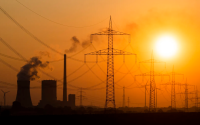25 December 2006Anjali Kwatra
While the eyes of the world are focused on the international military coalition's continuing struggle with the Taliban, Afghan children are dying because of a little reported drought which has hit huge areas of the country.
The U.N. says 1.9 million people are at risk because of the drought and along with the Afghan government has appealed for $76 million for food aid.
In one village, Sya Kamarak in western Afghanistan, three children died recently on the same day from malnutrition.
The father of one of them, Attalullah, said he was angry that millions of dollars were coming into his country in aid, but he did not have enough to feed his two-year-old daughter Uzra.
"We had very little milk or food to give my daughter. She was always hungry and crying," he said, sitting by the small pile of stones that marks the grave of his daughter.
"Lots of money is coming into our country but here we do not see any of it."
The villagers say 50 children have died so far this year -- a far higher number than usual -- because of the drought.
Almost all the 300 families in Sya Kamarak, which is a day's drive along bumpy tracks from the nearest city Herat, live off the land and most lost all their wheat harvest when the rains failed in April and May.
A Christian Aid assessment of the drought in five northern and western provinces showed that farmers lost between 80 and 100 percent of their crops in the worst affected areas and water sources in many villages had dried up.
Jan Bibi, 40, whose three-month-old daughter Nazia also died, said she had been feeding her with boiled water and sugar because she had nothing else.
Her surviving twin daughter Merzia is the size of a newborn rather than a three-month old and cries continually for food.
Dark future
"I am worried about my baby," said Jan Bibi. "The future is dark because we don't have food or water. We don't know how we will survive."
The drought has also hit hard in the south of the country where British troops are fighting an insurgency. The Afghan government has said that 20,000 families have been displaced in the south because of a combination of fighting and drought.
Although the west of the country is not a Taliban stronghold, many of the poor farmers said they could understand why people would sign up to fight when they were desperately poor.
"We have just a few kilograms of flour left to make bread with and we spend all day collecting twigs to use for fuel for cooking and heating. If anyone will provide us with a means of livelihood then we would join them rather than starve to death," said Attalullah.
Others said they would consider growing poppies which grow well in dry climates just to earn enough to buy food.
Not only is food scarce, but each day children as young as six are sent to collect water from taps or wells up to three hours away.
Christian Aid has so far allocated $1.2 million, including $735,000 committed by the European Union Humanitarian aid department (ECHO), to emergency drought projects including distributing food and animal fodder, digging wells, training women in carpet weaving so they can earn money for their families and counseling.
A partner organization, ADHAA (Agency for Humanitarian and Development Assistance for Afghanistan) is working in Sya Kamarak and nearby villages to provide fresh water through wells or laying pipes.
ADHAA is trying to work on long term irrigation projects as the droughts in Afghanistan seem to strike more and more frequently.
Village elders say that droughts used to occur every 15 to 20 years, but the last drought finished just two years ago. They also say that winters are not as cold as they used to be and summers are hotter. Some experts attribute these changing weather patterns to climate change.
Shirin, 35, a farmer from nearby Kazar Boolaq village, said: "This year I got nothing from my fields. I am selling my livestock slowly to survive. I have two children and we are eating tea and bread and potatoes. We are worried about winter and about losing our children."
http://edition.cnn.com/2006/WORLD/asiapcf/12/25/afghan.drought/index.html






